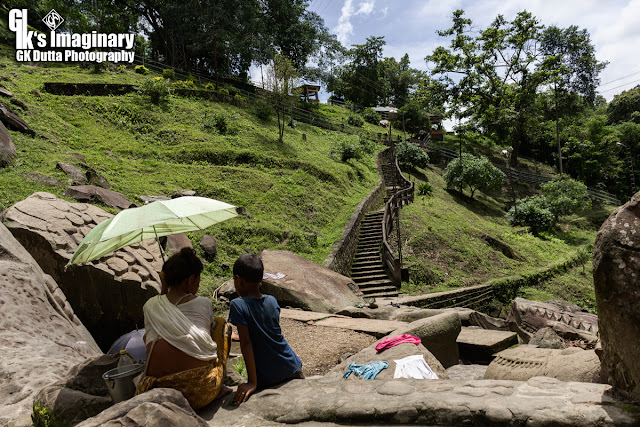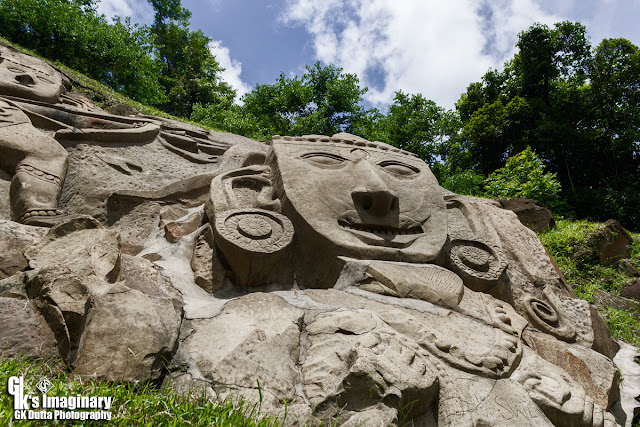
Tripura has beautiful rock cut carvings and stone images at Unakoti is a
profusion of rock-cut images, belonging to 11-12th century A.D. ,
intricate and finely executed. This is as such an open air art gallery.
Truly, over the backdrop of widespread hill ranges, surrounded by lush
green and bush, a large no. of colossal figures of Hindu gods &
goddesses engraved in a 45 mtr. Hillock. The place is 8 KM from District
hq. Kailashahar and 180 KM from capital Agartala.

The marvellous rock carvings, murals with their primitive beauty,
waterfalls are not to be missed. Unakoti means one less than a crore and
it is said that these many rock cut carvings are available here. As per
Hindu mythology, when Lord Shiva was going to Kashi along with one
crore gods and goddesses he made a night halt at this location. He asked
all the gods and goddesses to wake up before sun rise and proceed for
Kashi.

It is said that in the morning, except Shiva himself, no one else could
get up so Lord Shiva set out for Kashi himself cursing the others to
become stone images. As a result we have one less than a crore stone
images and carvings at Unakoti. These carvings are located at a
beautifully landscaped forest area with green vegetation all around
which add to the beauty of the carvings. The images found at Unakoti are
of two types, namely rock-carved figures and stone images.

Among the rock cut carvings, the central Shiva head and gigantic Ganesha
figures deserve special mention. The central Shiva head known as
‘Unakotiswara Kal Bhairava’ is about 30 feet high including an
embroidered head-dress which itself is 10 feet high. On each side of the
head-dress of the central Shiva, there are two full size female figures
– one of Durga standing on a lion and another female figure on the
other side. In addition three enormous images of Nandi Bull are found
half buried in the ground. There are various other stone as well as rock
cut images at Unakoti. Unakoti is termed as “Shaiva-Tirtha” which is
visited by thousands of pious people from all over the region
particularly during Ashokastami Mela in March-April to take a holy dip.

MYTHOLOGICAL SIGNIFICANCE:
There is much hearsay about Unakoti, the place of pilgrimage. The name Unakoti is derived from the thought that there was an assembly of gods and goddesses numbering one less than a crore . At a point of time the Lord of the gods, Mahadeva accompanied by the gods started for Benaras (Varanasi). When they reached at Raghunandan Hill, they decided to spend the night at the place and then start for Varanasi the next morning. But in the hours of dawn, only Mahadeva woke up. Then the Lord of the gods left for the destination alone; while all other gods and goddesses turned in stone images as they were fast asleep.
There is much hearsay about Unakoti, the place of pilgrimage. The name Unakoti is derived from the thought that there was an assembly of gods and goddesses numbering one less than a crore . At a point of time the Lord of the gods, Mahadeva accompanied by the gods started for Benaras (Varanasi). When they reached at Raghunandan Hill, they decided to spend the night at the place and then start for Varanasi the next morning. But in the hours of dawn, only Mahadeva woke up. Then the Lord of the gods left for the destination alone; while all other gods and goddesses turned in stone images as they were fast asleep.


The history of old Kailashahar is also associated with Unakoti. A 15th
generation descendant of King Jujhar Fa, a Shiva disciple who started
the Tripurabda (Tripuri Calendar), prayed for Lord Shiva in a village
called Chhambulnagar on the banks of the river Mau. It is speculated
that Chhambulnagar, which is mentioned in Rajmala, was situated near
Unakoti Hill. The Prince prayed for Mahadeva in Unakoti. For this some
people believe that the previous name of Kailashahar was Chhambulnagar.
Some believers thought that Har (Shiva) resides in Kailash. Therefore
the place was known as Kailash Har which was later on transformed to
Kailashahar. A Tripura king named Adi-Dharmapha ruled here in 7th
century. He performed a great yagna with much pomp and gaiety. The name
Kailashahar found currency since that time.

Who created such marvellous rock carvings and the stone images of gods
and Goddesses in such a deep forest hundred years ago is indeed a
mystery. Why this secluded hilly place was selected for the purpose is
not known. But the place is still accessible. But mystery still revolves
round Unakoti. The hilly forests, the spring, chirping of birds, the
carvings in stones and rocks, the leisurely -scattered idols and hearsay
have given a special significance to Unakoti.













